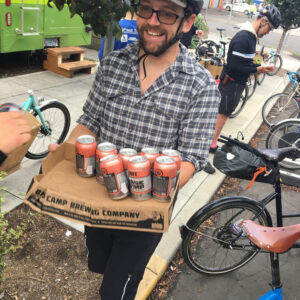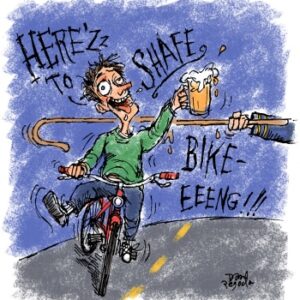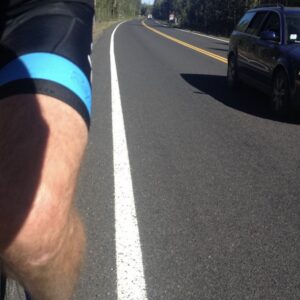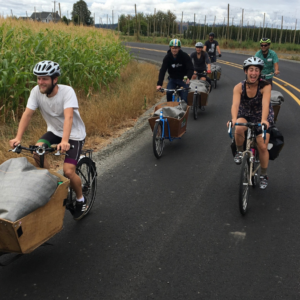“If bicyclists are driving under the influence, they are endangering themselves the most. The risk to others is far less than those operating a car.”
– Tom Andersen, Oregon House Representative
The potential to cause harm while bicycling under the influence is different than when you’re driving a car, so the fines and penalties for doing so should be too. That was the thinking behind a bill that passed the Oregon Legislature this past session.
House Bill 2316 included a package of revisions to Oregon’s driving under the influence laws. It expanded the types of intoxicants that could trigger a DUI conviction, it changed eligibility options for diversion programs, and it reduced the fines and penalties for people cited for bicycling under the influence.
You might not have realized it, but current Oregon DUI law applies equally to operators of cars and bicycles. It’s likely that authors of our original DUI law didn’t consider bicycling under the influence, but because a “bicycle” is considered a “vehicle” in Oregon statute (unless the law obviously cannot apply to a bicycle), the law captures everyone with the same net.
Given that bicycle DUIs are inherently less of a threat to public safety than car DUIs, Mae Lee Browning, the legislative director for the Oregon Criminal Defense Lawyers Association, felt the punishment should more closely fit the crime. “The level of harm is just different,” Browning shared in an interview with BikePortland. “I know that bicycles can go into a street and cause car crashes, but they are different.”
Browning worked closely on the bill with legislator Jason Kropf, a Democrat from Bend who’s also chair of the House Judiciary Committee. Lobbyists with the Oregon District Attorneys Association also worked on the bill.
Reached at her office for comment today, Browning said the bicycle provisions were her group’s idea. Much of her work is focused on reducing criminal penalties and helping people avoid lengthy prison sentences and other barriers that make it hard for them to re-enter society after being convicted of a crime. “Ideally, we wanted to make bike DUIs, not a DUI at all, but that wasn’t going to be feasible,” Browning said. She then hoped to prohibit bicycle DUIs from being a predicate for felony DUI. That is, current law says if you get three DUIs in 10 years, the third one is a felony. Browning wanted bike DUIs to not count in that tally. But that would have required a 2/3 vote since the DUI law was passed via a ballot measure.
So Browning opted instead to reduce the fines and other penalties associated with bicycling under the influence. Here’s how the bill impacts intoxicated bicycle riders:
- Instead of a minimum $1,000 fine, HB 2316 makes BUI a minimum $500 fine. (But if the person is bicycling with a 0.15 blood-alcohol content or higher, they are fined the same as a driver.)
- The bill does not apply to electric bikes. So if you’re on an e-bike, you’re treated just like you were driving a car.
- Provisions in the law relating to suspension and revocation of a drivers license do not apply if you were riding a bicycle.
- Judges will need to declare if a person was riding a bicycle or not. (This will give us better data in the future.)
- The maximum sentence for community service would be 48 hours, compared to as much as 500 hours if you were driving.
- People convicted of bicycle DUI will not be required to attend a victim impact treatment session.
Representative Tom Andersen (D-19) was one of the supporters of the bill. An attorney and cyclist himself, Rep. Andersen shared with BikePortland via email, “The punishment should fit the potential danger caused by a crime.” Here’s more from Andersen:
“Operating a vehicle of any kind while under the influence is dangerous but a car is different than a bicycle. A car is a weapon of mass destruction and can hurt many people such as other passengers in the car, other cars with multiple passengers, pedestrians, cyclists, or other large groups of people sharing the road. A bicyclist isn’t a massive weapon of destruction. If bicyclists are driving under the influence, they are endangering themselves the most. The risk to others is far less than those operating a car.”
To Browning, when people choose to ride a bike instead of drive, it’s often because it’s safer than driving a car. “So people are already taking that extra step to reduce harm,” she said.
“We’re trying to right-size the criminal justice system.”
The new law goes into effect January 1st, 2024.








Thanks for reading.
BikePortland has served this community with independent community journalism since 2005. We rely on subscriptions from readers like you to survive. Your financial support is vital in keeping this valuable resource alive and well.
Please subscribe today to strengthen and expand our work.
One thing that I think should be changed that it sounds like was not here is that currently in Oregon if you get a DUI you are not allowed to operate an e-bike. Many people who get DUI’s continue to drive while they are suspended, I believe that removing the ban on e-bikes might get some drivers who are not supposed to be behind the wheel out of their cars which would be safer for all of us.
That’s interesting Bjorn. I feel like if someone would have realized that they would have gotten that change made. You should reach out do OCDLA Mae Lee Browning and let her know.
It would be interesting to take this farther… bigger vehicles have higher fines and smaller lower. I do agree this doesn’t go far enough
Ho?d on now, that’s not enough. We need to inject income, gender and race to make these fines truly equitable.
Obvious trolling, but Finland actually does scale traffic fines based on income. Folks who claim to care about the impact of fines on lower-income people would do well to get on board with this approach:
https://www.euronews.com/2023/01/04/finlands-progressive-punishment-when-it-comes-to-speeding-tickets
Actually *several* European countries already do this:
https://www.nbcnews.com/id/wbna34792272
Yes! It’s insane to me that we don’t scale fines based on income. I don’t see a reason to consider gender or race though.
I mean the whole point of these fines is as a deterrent but by not scaling them the deterrent factor is reduced the more money you make. Make $500k a year and your deterrent is ~1/10th what someone making $50k is.
Income and/or net worth, yes.
Interesting. I think it’s a good step in the right direction, although it still seems disproportionately harsh. Ask yourself the hypothetical, if all drunk drivers on the road (who are already there today endangering lives) were converted to drunk cyclists, would you even be worried? I know I wouldn’t, that’s someone I don’t have to worry about plowing me over in one of the paint-only bike lanes. It’s almost funny as a way to improve mode share, but we should be advertising that you should cycle home drunk instead of drive. Get people out of their cars! Do that, and then strictly enforce intoxication tests on anyone leaving a bar who parked a car there.
Yes it still doesn’t go far enough. But like it says in the article, you start with what you want and then you have to do what is actually politically possible. OCDLA wanted to eradicate bicycle DUI altogether but realized it would not pass muster with DAs or lawmakers.
Get out of your car. Do you always take public or alternate transportation? Good question huh?
Do you always drive around town drunk in your SUV? Because that’s what we’re talking about here. Even if you never step foot outside of your land tank or whatever you drive, I’m sure even you would agree it’s better to get T-boned by a bicycle + rider weighing ~250 pounds and going 18mph than an Escalade going 50 through a red light.
An objection to that would be that drunk cyclists can still cause crashes doing the same things drunk drivers do–weaving, running stop signs, etc. They may be more likely to hurt themselves than others, but doing those things is still dangerous to others.
BUT if they do any of those things that endanger others, they’re breaking a law already, and can be charged with that even if biking drunk is legal.
The idea behind making drunk driving illegal is that the potential harm to others is so great. With biking drunk, that just isn’t the case, as you said.
So I agree. It seems that the benefits of legalizing (or moving further towards legalizing) drunk biking could easily outweigh any potential harm.
The same argument can be made about drunk pedestrians. Should that be illegal as well? Seems like a recipe for making sure drunks always drive, since If they’re going to be punished anyway, they may as well use the most convenient form of transportation.
Yes, exactly–of course drunk walking shouldn’t be illegal.
Also, you can make the same argument against drunk walking that people (like meh above) make about drunk biking–that they can both cause others to crash. But again, the odds of being hurt by the actions of a drunk walker or biker are much smaller than by a drunk driver. So treating drunk biking (or walking) harshly legally doesn’t make sense.
I see now. I misunderstood your earlier comment, sorry.
We definitely need to outlaw drunk crawling. Though not as dangerous as drunk walking, even a low-speed crash between two drunk crawlers can escalate into something life threatening. At the very least, a helmet should be required.
You’re certainly in the running for the BP Mark Twain prize. 😉
Isn’t being a drunk pedestrian already illegal, by way of public intoxication laws? I’d argue that those existing laws should be more than enough to properly enforce safe bicycling. We don’t need separate car-centric DUI laws also applying to bikes.
Yes I’d still be worried, because the premise that a small vehicle like a bike can do less harm is wrong. A drunk cyclist swerving into traffic can cause as much damage as a person in a car doing the same. Motor vehicles trying to avoid the drunk cyclist can and do crash. There can be just as many people injured due to the drunk cyclist.
[citation needed]
“because the premise that a small vehicle like a bike can do less harm is wrong.”
No it isn’t. Hope that helps.
Your logic, taken seriously, would outlaw being drunk period. Maybe some people would like that. It would be healthier. But we treat cars specially because they are very dangerous and easy to mess up.
Good point. America tried it, in the 1920s. It was called Prohibition. It was an abysmal failure.
30 pound bike versus 3,000 pound motor vehicle, not to mention the speed at which a motor vehicle can reach. Is riding a bike while impaired good? of course not, but please stop with the false equivalance.
There you have it. The law considers e-bikes as motor vehicles (at least in this context). We will see how else this is manifest
Ugh. It’s so ridiculous. I could maybe see a separate tier with a class 3 like they do in Europe, where they consider them the same as mopeds, but a class 1 or 2 travelling on separated trails? Do we really think they’re equally dangerous with a drunk person pedaling or even throttling to someone behind the wheel of a Suburban on the highway?
When 50 percent or more of the bikes on the road are e bikes and there is no mayhem in proportion, we’ll realize that they are just bikes. I support stricter testing for all motor vehicle licensing, including my own, so if that’s a requirement for using an e bike I can stand it.
I would never say that e bikes can’t be misused. E bike riders are about as likely to be rude as any other cyclist, they’re just a bit more conspicuous. I’m afraid we’re going to see speed bumps or chicanes on multi use paths as a result. Our current model of policing is pretty unlikely to give us civil officers patrolling bikeways to chat up errant bike riders.
Speed bumps would be fun! Would be nice to get some air sometimes, maybe we could get some whoop sections. Maybe that could solve the licensing issue – just add some big jumps, whoops and tight corners, sort of a self-testing bike path?
I was with you until “separated trails.” What makes you think bikes are always on separated trails? I see many e-bikes riding with traffic, and that’s often how I ride mine.
You’re right! As long as we’re assuming that sameness = fairness perhaps we should also limit all other motor vehicles to 20mph and/or 750w?
Anyone thinking you can limit ebikes to 750w probably doesn’t know how motor controllers work. It’s the moto controller programming that limits the power not the motor itself and every ebike I’ve ever seen you can re-program the motor controller as easily as installing an app. Heck a lot of ebikes just give you a setting.
Get pulled over? push a button and now it’s set back to low power mode.
Ugh. Do we really have to do this? Electrical Engineer here. I understand how motors and motor controllers work. I understand that arbitrary limits on ebike speed and power are very difficult to enforce. I also understand physics, and am suggesting that our streets would be much safer places if every Ferd F-teenthousand on the road was equipped with a nominal 750W motor.
I will admit I was wrong about Oregon’s stated limits. Oregon is 1000W vs 750W in many other states. ORS 801.258 defines an ebike as having an electric motor that:
(a) Has a power output of not more than 1,000 watts; and
(b) Is incapable of propelling the vehicle at a speed of greater than 20 miles per hour on level ground.
Alls I’m sayin’ is that if you want equal penalties for intoxicated operation of a vehicle, place the same legal limits on the vehicle as well.
Thanks! I agree on the sentiment!
As an electrical engineer what is your interpretation of –
(5)Is equipped with an electric motor that:
(a)Has a power output of not more than 1,000 watts; and
(b)Is incapable of propelling the vehicle at a speed of greater than 20 miles per hour on level ground. [1997 c.400 §2; 1999 c.59 §233]
I’ve been trying to figure out for years what this actually means since a motors power output is generally just governed by the motor controller and the moto controller is basing its outputs based on it’s programming, throttle input etc. Then speed is just based on drag and gearing…
Aka many of the ebikes seem to have buttons that let you change their mode and many have class 3 or even unregulated modes. This seems to apparently be legal?
Does that mean I could take any electric motorcycle etc. and limit it and then it would be legal? Seems like it?
What the hell is wrong with your thinking? You have built all of these huge bike lanes, that are not paved and loaded with debis because street sweepers cannot access them, where bikes rarely utilize them and now you want to make bike riders exempt from being responsible for accidents caused by them? Decisions and laws are being approved and put into effect because our so called leaders ride bikes. Why don’t our so called leaders ride bikes to work and to buy groceries? I am so fed up with our city, county, state, U.S. appointed, can’t say voted for, leaders for not listening at all to us people. You have destroyed and continue to destroy anything left of civilization and our planet. Good job and I hope that they will allow you to travel by any means to hell.
I had no idea Bike Portland was this powerful, dang.
Darth Maus is powerful.
That’s not true. Name one type of accident a drunk biker would cause solely by being drunk, not involving breaking another law–one that they could be charged with to hold them responsible for any accident they cause.
There’s the Hot Pizza guy… he wasn’t drunk, but that kind of collision would be far more likely if he had been. I’m sure you could imagine some law he broke, but he wasn’t charged with anything (as far as I know). The article suggests he was obeying the speed limit on the trail when the collision occurred. If he had been drunk, I’m willing to bet he would have been charged and prosecuted.
So, there’s one.
https://www.spokesman.com/stories/2017/oct/18/woman-sues-hot-pizza-bicyclist-who-crashed-into-he/
EDIT: Found this:
https://www.kxly.com/news/local-news/woman-sues-man-who-yelled-hot-pizza-before-crashing-into-her-on-his-bike/article_d75b8f3c-0e2e-5c0f-a6e1-900229d9bce5.html
The articles mention several dangerous things he did that led to him crashing into the victim. He wasn’t charge with anything, but this states why: “ Spokane police said no citation could be issued since the collision was on a trail and not a road.”
https://www.spokesman.com/stories/2017/dec/31/2017-the-year-outdoors/
I guess you could say, well, on trails in Spokane no laws apply, so yes, this is a case where someone riding drunk could cause a crash without breaking any other laws (if the Spokane police were correct).
On the other hand, if all that’s true, I don’t think anyone can be confident he could have been charged if he’d been drunk (but on a trail, not a road) either.
In Oregon, if the trail is considered the same as a sidewalk, he would have broken one law by not yielding to the pedestrian, and perhaps another by not giving an audible signal before passing (unless yelling “Hot Pizza!” counts as an audible signal).
“I guess you could say, well, on trails in Spokane no laws apply”
That is a very very expansive reading of a one-line blurb in a newspaper. I highly doubt that bicycle paths in Spokane are law free zones.
Yes it is, and the fact that it is supports my view that he was likely breaking laws, meaning that if he was drunk, there were still likely to be other laws he could be charged with to hold him responsible for the crash.
We’ve all heard about this guy. Either he’s nuts, or he was intoxicated, or both. Meanwhile a whole lot of rogue motor vehicle users don’t have catchy names because the damage they do has become normal to us. Some years ago a motor vehicle operator went up NE 26th Avenue at high speed, ran the stop at Fremont, and killed at least one person. The what-ya-gonna-do guy, maybe?
The people who bike drunk (it’s happening tonight in spite of the potential harsh penalties) will keep on doing it with no collateral car crashes. Probably the staid and responsible motor vehicle users are keeping them safe.
I’m not arguing at the penalties for drunk biking should be the same as for drunk driving; qqq posed a question about whether there were ever a situation where drunk bicycling could be a problem without some other underlying traffic infraction, and I answered it.
It’s clear to me that drunk riding can harm people, but not at the level that drunk driving can. That said, drunk driving on an electric cargo bike probably presents much more of a danger than someone riding a BMX bike or some other low mass contrivance that is hard to go fast on. Should the law distinguish between those two scenarios?
And I’ll go with nuts for 500, Bob.
Can we please upvote Susie’s comment for comment of the week? I haven’t laughed so hard in a long time, and I’d love for Lisa to contact her for context. There’s a lot of rich material there.
I find it strange that in a city with a robust transit system, in the age of Uber and Lyft, so many commenters discuss this as though biking drunk and driving drunk are the only options someone has.
The “robust transit system” that has the audacity to call a bus schedule with 30m headways after 7pm as frequent service. No thanks.
I’m surprised this is even a thing. It’s one thing to drink and get behind the wheel of multi-ton hunk of steel, which poses a clear and present danger to anyone outside of the vehicle. If a cyclist drinks and crashes, the person most likely to die or be injured is the cyclist.
I’m confused about how this is actually enforced. With cars if you refuse a breathalyzer test your driver license is immediately suspended but there seems to be no downside if your riding a bicycle.
What we need next is even more reduced fines for unicycles, half the bike should mean half the fine!
If you drive drunk, likely you’ll kill somebody else before yourself. With biking drunk, most likely it’s the other way. So from a Darwin Awards perspective, yeah, it’s less risky for the public if you bike home from a bar…
I’ve always considered cycling a self administered field sobriety test.
If we really wanted to fix this Oregon could add to the vehicle code that infractions against bikes are not enforceable unless the bike rider caused an accident or injury. Otherwise it’s of no consequence except to the rider if a bike broke a traffic a law.